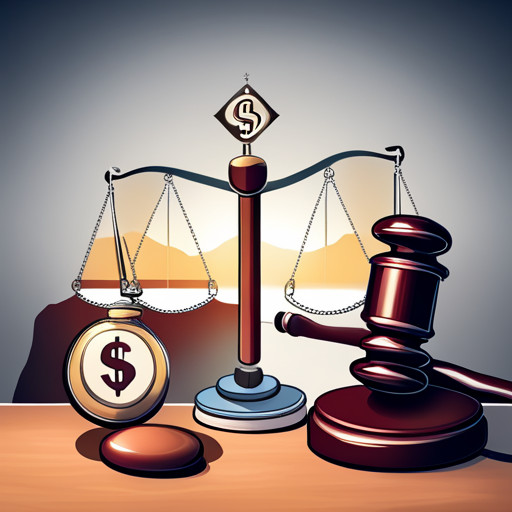Arizona Car Accident Guide Get Fair Compensation for Injuries
In Arizona, car accidents generate average payouts ranging from $5,019 to $212,832, depending on injury severity. This guide elucidates the immediate steps to take post-accident, fault determination rules, compensation rights, negligence's role, and the claim process.

It further highlights the importance of legal representation, insurance policies' role, and an expected timeline for a car accident case. The objective is to equip readers with the knowledge necessary for fair compensation pursuit after a car accident.
Key Takeaways
- Stay at the scene, call 911, and provide assistance to the injured
- Seek immediate medical treatment and gather evidence from the accident scene
- Notify both insurance companies and pursue compensation for injuries
- Arizona is a pure comparative fault state, allowing for partial recovery even if partially at fault
Understanding Car Accidents in Arizona

Understanding car accidents in Arizona entails knowledge of the state's fault and liability rules, the process to follow after an accident, and the compensation rights and rates typical in the state.
Arizona, a traditional fault state, applies pure comparative fault rules, allowing compensation even when the claimant shares some blame. Legal requirements mandate immediate reporting of accidents and appropriate aid to the injured.
Car accident statistics reveal a daily average of three fatalities and 141 injuries, highlighting the imperative need for prompt, comprehensive insurance claims. Compensation varies greatly, influenced by factors such as injury severity, shared negligence, and available insurance coverage.
Therefore, understanding these aspects is crucial to ensure fair and comprehensive compensation following a car accident in Arizona.
The Aftermath: Immediate Steps to Take Post-Accident

Immediate actions post-collision include remaining at the scene, exchanging relevant information, and calling emergency services as necessary. These steps form the foundation of a successful resolution to the unfortunate event.
The aftermath of a collision can be chaotic, but it is crucial to stay calm and follow these steps:
- Ensuring the safety of all involved by moving out of traffic if possible
- Documenting the scene and damages for future reference
- Contacting insurance companies promptly to report the incident
These immediate actions and subsequent steps taken post-accident can significantly impact the outcome of any legal proceedings or insurance claims. Therefore, understanding and accurately executing these steps is of utmost importance. Despite the stress of the situation, diligence and precision are paramount to ensure fair compensation.
Examining Fault and Liability Rules in Arizona

Examining the state's fault and liability rules reveals that traditional fault principles largely govern motor vehicle collision cases, with the person responsible for causing the incident typically held financially accountable. In essence, Arizona operates under a fault-based system. The driver who is determined to be at fault for causing the accident is liable for any property damage or personal injury that results.
This critical understanding is foundational when seeking compensation for property damage in Arizona. Furthermore, the state's pure comparative fault rule allows for reduction of compensation based on the percentage of fault of the claimant.
Thus, it is imperative to understand these rules when navigating the complex process of claims and settlements following an automobile accident in Arizona.
Compensation Rights for Accident Victims in Arizona

Victims of motor vehicle collisions within the state have the legal right to pursue monetary damages from the at-fault party, with the average settlement for a moderate claim amounting to $20,847, varying based on specific circumstances such as the severity of the injuries sustained, shared negligence, available insurance coverage, and the number of vehicles involved.
In the compensation calculation, factors such as medical expenses, lost wages, pain and suffering, and property damage are considered. Legal options available to victims include filing a personal injury lawsuit or seeking a settlement through insurance claims.
- The compensation amounts can significantly differ due to the degree of injuries.
- Shared negligence can affect the total compensation.
- The availability of insurance coverage can limit the compensation amount.
Understanding these elements is crucial for victims to secure a fair compensation.
The Role of Negligence in Car Accident Claims

Negligence plays a pivotal role in motor vehicle collision claims, as the injured party must provide negligence proof to secure a rightful settlement. Establishing fault requires a comprehensive understanding of the requisite legal elements: duty, breach, causation, and damages.
In Arizona, the claimant must demonstrate that the other driver had a duty to operate their vehicle safely, breached this duty, and directly caused the claimant's injuries, resulting in measurable damages. The complexity of these cases underscores the legal representation benefits, as experienced attorneys possess the knowledge and resources to effectively argue negligence.
An Overview of Arizona’s Shared Fault Rules

The examination of negligence in car accident claims paves the way to an understanding of Arizona's shared fault rules. As a pure comparative fault state, Arizona allows individuals involved in car accidents to seek compensation, even when they share some degree of fault. This makes understanding negligence claims paramount in these circumstances.
The percentage of fault allocated to each party impacts the compensation amount. Shared fault rules can complicate the claim process, necessitating expert legal advice. Seeking legal advice for shared fault cases can result in more favorable outcomes.
Thus, it is crucial to gain a comprehensive understanding of shared fault rules and how they intersect with negligence claims. This knowledge equips victims with the tools necessary to navigate the complexities of the legal system and secure fair compensation.
Navigating the Complexities of Shared Fault Cases

Understanding the intricacies involved in shared fault cases is key to navigating the legal landscape successfully. Such cases often hinge on the principle of comparative negligence, whereby fault is apportioned between parties involved in a vehicular accident.
This complexity necessitates exploring legal options with professional guidance. The legal professional's role is to assist the claimant in proving fault, which is a critical aspect of securing fair compensation. Detailed evidence, credible witnesses, and expert testimony often contribute to establishing negligence.
Evaluating the case from a shared fault perspective ensures a comprehensive understanding of potential liabilities. Therefore, it is essential to consult with an experienced personal injury attorney who can guide claimants through the complexities of shared fault cases in Arizona.
Determining the Average Car Accident Compensation in Arizona

Assessment of average settlements for vehicular mishaps reveals a range from $5,019 for minor physical harm to $212,832 for severe bodily injury, with the amount varying based on specific crash circumstances, injury severity, involved insurance limits, and the number of vehicles implicated. A crucial factor in determining compensation is the role of negligence.
In Arizona, the following points are critical:
- It operates under a pure comparative fault system, wherein compensation can be claimed even if the claimant is partially at fault.
- The percentage of negligence attributed to each party directly influences the compensation amount.
- Understanding insurance coverage and compensation is vital in ensuring fair settlement.
Thus, it is incumbent upon claimants to comprehend these nuances to secure appropriate compensation.
Factors Affecting Your Compensation Amount

Factors such as the severity of injuries, the degree of negligence, the extent of insurance coverage, and the number of vehicles involved significantly influence the monetary amount awarded in vehicle mishap settlements.
These factors affecting settlement outcomes are meticulously examined by insurance companies and legal professionals. The severity of injuries directly correlates with the medical expenses incurred, thereby influencing the compensation amount.
The degree of negligence attributed to each party is a factor considered under Arizona's comparative fault rules, with each party's compensation reduced in proportion to their fault percentage.
The extent of insurance coverage sets the upper limit for potential compensation, while the number of vehicles involved can complicate the settlement process.
Understanding these factors is pivotal to maximizing compensation in the aftermath of a vehicular mishap.
The Process of Claiming Compensation: A Step-By-Step Guide

Navigating the process of claiming compensation following a vehicular incident involves several essential steps, beginning with immediate actions at the accident scene and culminating in the possible negotiation of a settlement. This process underscores the importance of evidence collection and seeking medical treatment promptly.
- Immediately after the accident, evidence collection is crucial. It includes taking photographs, collecting witness information, and preserving physical evidence.
- Seeking medical treatment should not be delayed, even if injuries seem minor. Medical records serve as vital evidence.
- Lastly, filing a claim with the insurance company should be done promptly.
These steps, when properly executed, can significantly enhance the potential for a fair settlement. An experienced personal injury attorney can provide invaluable assistance throughout this process.
The Importance of Legal Representation in Car Accident Cases

Legal representation plays a critical role in successfully navigating claims related to vehicular incidents, particularly when dealing with complex issues such as shared fault rules and negotiating settlements.
Finding the right personal injury attorney can significantly increase the likelihood of securing a fair and adequate settlement. The benefits of legal representation include expert knowledge of Arizona's liability rules, negotiation skills for dealing with insurance companies, and the ability to litigate, if necessary.
The attorney's understanding of shared fault rules can ensure that clients are not unfairly penalized based on their percentage of fault.
Thus, for individuals involved in traffic incidents in Arizona, securing legal representation should be a priority in their journey towards obtaining fair compensation.
Understanding Insurance Policies and Their Role in Compensation

Understanding the intricacies of insurance policies is crucial when seeking compensation for damages incurred in vehicular incidents. Familiarity with the limits of one's policy can greatly influence the outcome of compensation negotiations.
Key considerations for understanding insurance policy limits and negotiating fair compensation with insurance companies include:
- Comprehension of policy limits: These define the maximum amount that an insurance company will pay for a particular claim.
- Strategic negotiation: It is essential to present a thoroughly researched and well-documented claim to facilitate effective negotiation.
- Legal representation: A knowledgeable attorney can significantly aid in navigating the complexities of insurance policies and in securing fair compensation.
These elements play a pivotal role in ensuring that victims of vehicular incidents receive the compensation they rightfully deserve.
What to Expect: The Timeline of a Car Accident Case

Moving forward from the exploration of insurance policies' role in compensation, attention is now directed toward the timeline of a car accident case.
A crucial understanding of the sequence of events in a lawsuit is essential for affected individuals. Typically, the timeline of settlement negotiations unfolds in stages, starting from initial investigations, through the discovery phase, to the final resolution.
The role of expert testimony during these phases is undeniably crucial as it lends credibility to the evidence presented. These testimonies, provided by medical, accident reconstruction, or economic experts, could significantly influence the outcome of the case.
The timeline and the input of experts are interwoven, shaping the trajectory of the case, and potentially, the settlement's size.
Frequently Asked Questions
How Does the Weather or Road Conditions Impact a Car Accident Case in Arizona?
Weather or road conditions significantly influence car accidents in Arizona. Aspects such as seasonal accidents or weather liability can crucially impact case outcomes.
For instance, a driver may be held less accountable if an accident occurs due to unexpected, severe weather conditions. However, if the driver failed to adjust driving behavior in response to predictable seasonal weather changes, they may be found more liable.
Hence, weather and road conditions can affect fault determination and compensation calculations.
How Can Mental Health Damages, Such as Trauma or Anxiety, Be Factored Into the Compensation for a Car Accident in Arizona?
In Arizona, mental health damages resulting from a car accident, such as trauma or anxiety, are factored into compensation through an Emotional Distress Evaluation and Psychological Impact Assessment. These assessments consider the extent of psychological harm sustained and its impact on quality of life.
They form part of the non-economic damages in a claim, alongside physical pain or suffering, and require substantiation through professional diagnosis and treatment records.
What Is the Process of Filing a Car Accident Claim if the At-Fault Driver Is Uninsured or Underinsured in Arizona?
In the event an at-fault driver is uninsured or underinsured in Arizona, steps exist for filing a claim.
Firstly, inform the insurance company about the incident. If there's uninsured motorist coverage, this may pay for damages.
Claim documentation, crucial for successful compensation, should include accident reports, medical records, and repair bills.
Legal representation is advisable, as legal complexities may arise in situations involving uninsured or underinsured drivers.
Can the Severity of My Injuries Affect the Time It Takes to Settle My Car Accident Claim in Arizona?
The severity of injuries sustained in a car accident can indeed influence the duration of claim settlement process in Arizona. This is primarily due to the necessity of comprehensive medical documentation to substantiate the injury claim.
The compensation calculation methods also take into account injury severity, with more serious injuries generally leading to larger settlements.
However, these factors may prolong the claim resolution as they require detailed examination and negotiation.
What Role Does the Type of Car or Safety Features Play in Determining Fault or Compensation in a Car Accident in Arizona?
In Arizona, vehicle technology or safety features can impact fault determination and compensation calculation post-accident.
Advanced safety features, such as automatic emergency braking, may be considered when determining driver negligence. However, the presence of such features does not absolve a driver from fault.
Compensation is typically influenced by factors like injury severity, shared negligence, and insurance limits, rather than specific car types or safety features.

This post has been generated by AI and was not reviewed by editors. This is Not legal advice. Please consult with an attorney.




